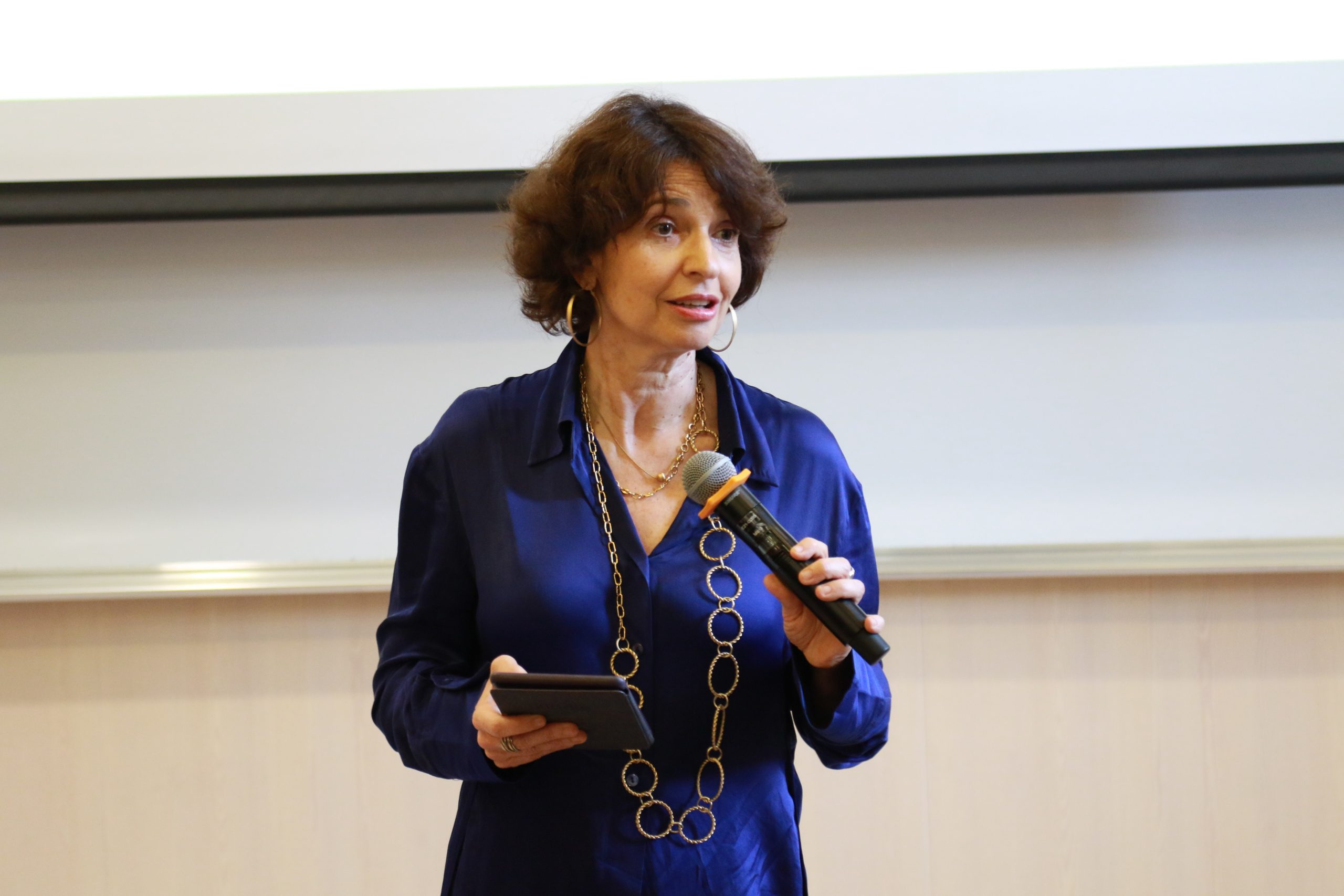News Express: UM Macao Humanities Forum explores Portuguese experience in shaping university as place of culture
新聞快訊:鏡海人文論壇探討葡國高校文化傳承

Fátima Vieira
鏡海人文論壇探討葡國高校文化傳承
澳門大學人文學院於2025年4月24日舉辦“鏡海人文論壇”,由葡萄牙波爾圖大學副校長Fátima Vieira以“大學與文化傳承:葡萄牙經驗分享”為題發表演講,吸引眾多師生參與。
澳大人文學院助理院長鄺耀基致歡迎辭時指,2025年澳門當選東亞文化之都,而澳大地處中西文化交匯之地,致力於通過教育促進全球理解。文化教育不僅是學術追求,更是一段探索、理解和包容的旅程。澳大葡文系主任João Veloso介紹Fátima Vieira,指她擔任波爾圖大學副校長以來,將大學從封閉的歷史建築開放為城市文化中心,並聯合地方政府設計包容性項目,使大學成為連結學術與社區的紐帶。作為一名烏托邦研究專家,她將學術理念融入社會創新,為大學與城市的融合樹立了國際典範。
Fátima Vieira指出,波爾圖大學與澳門大學同樣是“沒有圍牆的大學”(University Without Walls),校園皆面向全社會開放。歐洲大學協會(EUA)《大學無牆界:歐洲大學2030年的願景》首次將文化列為大學第四使命。波爾圖大學以此為藍本,推動文化融入學術生態。該校在科學課程中融入倫理模塊,推動醫科學生參與藝術實踐,如開設“詩歌與醫學”課程,學生在國家劇院和博物館實地學習,打破學科壁壘;在校內的“共享之家”(Casa Comum),通過280場免費文化活動,吸引社會公眾參與;創新推出“文化處方”(Cultural Prescription)計劃,與醫療體系合作,將藝術活動納入心理健康治療;重塑大學博物館與植物園為公共知識平台,通過情感連結激發公眾環保意識;與葡萄牙大學校長協會藝術與文化專業委員會共建“文化走廊”(Cultural Corridor),推動全球協作,為合作高校的學生提供優惠資源,激活區域經濟與文化活力,拓展該區域性文化項目至歐洲級文化交流平台。Fátima Vieira主張,大學應培養兼具科學素養與人文關懷的公民,以應對氣候危機、數位轉型等全球挑戰。
在問答環節中,澳大師生就如何吸引學生到博物館參與文化活動、波爾圖大學作為分散校區怎樣與當地文化機構互動及其對跨領域合作的挑戰等內容,與Fátima Vieira進行深入探討。Fátima Vieira表示,波爾圖大學會為參與活動的學生提供免費接駁巴士,設計互動性活動,並邀請受歡迎的藝術家吸引學生。她又指,波爾圖大學雖無集中校區,但可以通過“文化走廊”項目促進學生與社區互動,並通過校外博物館、劇院等場所的課程實踐,加強文化參與,使學生的學習不限於校內。
這是“鏡海人文論壇”2024/2025學年的第六講。論壇每學年都會邀請不同領域的知名人文學者,與澳門師生分享前沿研究成果。過往的論壇主題涵蓋文學、語言學、歷史、翻譯、藝術等多個領域。
欲瀏覽官網版可登入以下連結:
https://www.um.edu.mo/zh-hant/news-and-press-releases/press-release/detail/61244/
UM Macao Humanities Forum explores Portuguese experience in shaping university as place of culture
The Faculty of Arts and Humanities (FAH) of the University of Macau (UM) held the Macao Humanities Forum on 24 April, where Fátima Vieira, vice-rector for culture and museums of the University of Porto, delivered a lecture titled ‘The University as a Place of Culture: The Portuguese Experience’. The lecture attracted many students and faculty members.
In his welcome address, Joaquim Kuong, assistant dean of FAH, noted that Macao has been selected as a ‘Cultural City of East Asia 2025’. The city, with its unique background as a melting pot of Eastern and Western cultures, is committed to fostering global understanding through education. Cultural education is not just an academic pursuit, but also a journey of discovery, understanding, and growth. João Veloso, head of the Department of Portuguese, said that since her appointment as vice-rector of University of Porto, Prof Vieira has transformed the university into a cultural centre in the city. She has also facilitated inclusion initiatives with the local government, establishing the university as a bridge between academia and the community. As an expert in Utopian studies, Prof Vieira advocates integrating academic ideas into social innovation, setting an international model for the integration of universities and communities.
During the lecture, Prof Vieira pointed out that both the University of Porto and UM exemplify the concept of ‘universities without walls’, as their campuses are open to the public. She referenced the European University Association’s seminal document titled ‘Universities without walls: A vision for 2030’, which, for the first time identified culture as the fourth mission of universities. Prof Vieira mentioned that the University of Porto has adopted a number of measures to integrate culture into its academic ecosystem. These include: 1) incorporating ethics modules into science programmes to encourage medical students to participate in art activities such as the ‘poetry and medicine’ course, which involves visits to national theatres and museums; 2) launching the ‘Casa Comum’ initiative, which holds 280 public cultural events every year open to the public; 3) launching the ‘Cultural Prescription’ project in collaboration with healthcare institutions to incorporate artistic activities into mental health treatments; 4) transforming the university’s museums and botanical garden into public learning platforms to raise awareness of environmental protection by fostering emotional connections; 5) launching the ‘Cultural Corridor’ project in collaboration with the Expert Committee for the Arts and Culture of the Council of Rectors of Portuguese Universities (CRUP) to promote global collaboration, provide students from partner institutions with abundant resources, boosts economic and cultural vitality of the region, and expand regional cultural programmes to include other European institutions. Prof Vieira proposed that universities should cultivate students to become well-rounded citizens with both scientific literacy and humanistic values, in order to address global challenges such as climate crisis and digital transformation.
During the Q&A session, UM students and faculty members engaged in in-depth discussions with Prof Vieira on various topics, including how to encourage students to participate in cultural activities at museums; how the University of Porto, a university with several campuses spread across the city, interacts with local cultural institutions, and the challenges of establishing cooperation between different sectors. Prof Vieira explained that the University of Porto provides students with free shuttle bus services to cultural events and organises interactive activities featuring popular artists to boost engagement. Despite not having a centralised campus, the University of Porto encourages community involvement and cultural participation among its students through the ‘Cultural Corridor’ project and off-campus learning at museums and theatres, ensuring education extends beyond university walls.
This was the sixth lecture of the Macao Humanities Forum for the 2024/2025 academic year. Every year, the forum invites distinguished scholars in different fields of the humanities to present their latest research findings with students and faculty members in Macao. Previous lectures of the forum have covered a wide range of topics, including literature, linguistics, history, translation, and the arts.
To read the news on UM’s official website, please visit the following link:
https://www.um.edu.mo/news-and-press-releases/press-release/detail/61244/